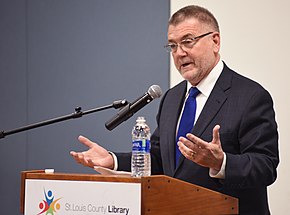
Zyklon B was the trade name of a cyanide-based pesticide invented in Germany in the early 1920s. It consisted of hydrogen cyanide, as well as a cautionary eye irritant and one of several adsorbents such as diatomaceous earth. The product is notorious for its use by Nazi Germany during the Holocaust to murder approximately 1.1 million people in gas chambers installed at Auschwitz-Birkenau, Majdanek, and other extermination camps. A total of around 6 million Jews were murdered during the Holocaust.

Interessengemeinschaft Farbenindustrie AG, commonly known as IG Farben, was a German chemical and pharmaceutical conglomerate. Formed in 1925 from a merger of six chemical companies—BASF, Bayer, Hoechst, Agfa, Chemische Fabrik Griesheim-Elektron, and Chemische Fabrik vorm. Weiler Ter Meer—it was seized by the Allies after World War II and divided back into its constituent companies.

The Reich Security Main Office was an organization subordinate to Heinrich Himmler in his dual capacity as Chef der Deutschen Polizei and Reichsführer-SS, the head of the Nazi Party's Schutzstaffel (SS). The organization's stated duty was to fight all "enemies of the Reich" inside and outside the borders of Nazi Germany.
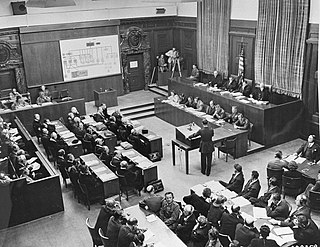
The United States of America vs. Carl Krauch, et al., also known as the IG Farben Trial, was the sixth of the twelve trials for war crimes the U.S. authorities held in their occupation zone in Germany (Nuremberg) after the end of World War II. IG Farben was the private German chemicals company allied with the Nazis that manufactured the Zyklon B gas used to commit genocide against millions of European Jews in the Holocaust.
Harold Marcuse is an American professor of modern and contemporary German history and public history. He teaches at the University of California, Santa Barbara. He is the grandson of philosopher Herbert Marcuse.

Saul Friedländer is a Czech-Jewish-born historian and a professor emeritus of history at UCLA.

Monowitz was a Nazi concentration camp and labor camp (Arbeitslager) run by Nazi Germany in occupied Poland from 1942–1945, during World War II and the Holocaust. For most of its existence, Monowitz was a subcamp of the Auschwitz concentration camp; from November 1943 it and other Nazi subcamps in the area were jointly known as "Auschwitz III-subcamps". In November 1944 the Germans renamed it Monowitz concentration camp, after the village of Monowice where it was built, in the annexed portion of Poland. SS Hauptsturmführer (Captain) Heinrich Schwarz was commandant from November 1943 to January 1945.
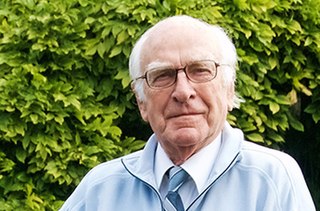
John Seymour Conway was Professor Emeritus of History at the University of British Columbia, where he taught for almost 40 years. His work focused on the role of the Vatican and German churches during the Holocaust; on 20th-century Christian–Jewish relations; and on the Holocaust in Hungary and Slovakia.
Jeffrey C. Herf is an American historian. He is Distinguished University Professor of modern European, in particular modern German, history at the University of Maryland, College Park.

The Holocaust, also known as the Shoah, was the genocide of European Jews during World War II. Between 1941 and 1945, Nazi Germany and its collaborators systematically murdered some six million Jews across German-occupied Europe; around two-thirds of Europe's Jewish population. The murders were carried out in pogroms and mass shootings; by a policy of extermination through labor in concentration camps; and in gas chambers and gas vans in German extermination camps, chiefly Auschwitz-Birkenau, Bełżec, Chełmno, Majdanek, Sobibór, and Treblinka in occupied Poland.
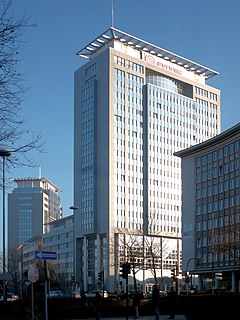
Evonik Industries AG is a stock-listed German specialty chemicals company headquartered in Essen, North Rhine-Westphalia, Germany. It is the second largest chemicals company in Germany, and one of the largest specialty chemicals companies in the world. It is predominantly owned by the RAG Foundation and was founded on 12 September 2007 as a result of restructuring of the mining and technology group RAG.

Like many other Western nations at the time, Germany suffered the economic effects of the Great Depression with unemployment soaring around the Wall Street Crash of 1929. When Adolf Hitler became Chancellor of Germany in 1933, he introduced policies aimed at improving the economy. The changes included privatization of state industries, tariffs on imports, and an attempt to achieve autarky. Weekly earnings increased by 19% in real terms from 1933 to 1939, but this was largely due to employees working longer hours, while the hourly wage rates remained close to the lowest levels reached during the Great Depression. In addition, reduced foreign trade meant rationing of consumer goods like poultry, fruit, and clothing for many Germans.
Stephen H. Norwood is a professor of history at the University of Oklahoma. He received his PhD at Columbia University in 1984.
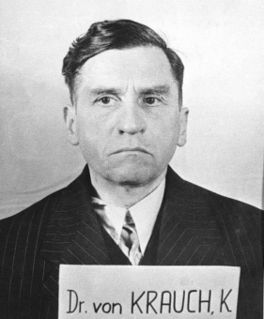
Carl Krauch was a German chemist, industrialist and Nazi war criminal. He was an executive at BASF ; during World War II, he was chairman of the supervisory board. He was a key implementer of the Reich’s Four-Year Plan to achieve national economic self-sufficiency and promote industrial production. He was Plenipotentiary of Special Issues in Chemical Production, a senator of the Kaiser Wilhelm Society, and an honorary professor at the University of Berlin. He was convicted in the IG Farben trial after World War II and sentenced to six years in prison.
Carl Wurster was a German chemist and Wehrwirtschaftsführer during the Third Reich. He subsequently became one of the leading figures in post-war Germany's industrial life.
Francis R. Nicosia works as a historian at the University of Vermont with a focus on modern history and Holocaust research.

The Holocaust in Germany was the systematic persecution, deportation, imprisonment, and murder of Jews in Germany as part of the Europe-wide Holocaust perpetrated by Nazi Germany. The term typically refers only to the areas that were part of Germany prior to the Nazi regime coming to power and excludes some or all of the territories annexed by Nazi Germany, such as Austria or the Protectorate of Bohemia and Moravia.

Private sector participation in Nazi crimes was extensive and included widespread use of forced labor in Nazi Germany and German-occupied Europe, confiscation of property from Jews and other victims by banks and insurance companies, and the transportation of people to Nazi concentration camps and extermination camps by rail. After the war, companies sought to downplay their participation in crimes and claimed that they were also victims of Nazi totalitarianism. However, the role of the private sector in Nazi Germany has been described as an example of state-corporate crime.
